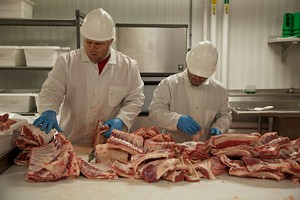Published August 14, 2013 at 12:35 p.m. | Updated October 16, 2020 at 3:42 p.m.
The 25 Berkshire-Chester pigs that recently arrived at 45 Fairbanks Road in North Springfield had lived a charmed life, at least for pigs: eating grain that had been hand-ground by their owner and waddling contentedly around 200 hilly acres near Enosburg Falls. And, after they met a quick end at a local slaughterhouse, the pigs became pioneers, of a sort.
Cut lengthwise, they were packed into carcass-size plastic bins and trucked to Black River Produce. This spring, the North Springfield-based fresh-food distributor took on a new role: meat processor. It was there, at Black River’s still-under-construction processing facility, that the pig sides were unloaded and rolled through the mostly empty building to the hanging room at its center. There, six men in white coats and rubber boots hung the sides on hooks and, one by one, got to work on them with saws and knives. In just a day and a half, the 25 pigs were transformed into piles of ham, loins, chops, trotters and heads.
Just as quickly, those parts disappeared in something of a pork diaspora: bellies and ham were sent to Vermont Smoke and Cure; other bellies to the chef of Craigie On Main in Cambridge, Mass. Legs went to Rhode Island’s Daniele to be made into prosciutto. Various cuts were trucked to chefs around Vermont (“One chef buys all of the heads,” says production manager Dominic Barone). Tenderloins and other chops were sealed, marked with a Black River Meat label and shelved in the company’s enormous cooler, destined to be sold at retail stores around Vermont and New Hampshire.
Though Black River Produce’s new plant — which also processes seafood — is barely three months old, its cutters work with intensity and speed, making this place a potential game changer for the local meat industry. Vermont has long struggled with a bottleneck at the slaughtering and processing levels, a frustrating challenge for farmers who might otherwise grow their herds to meet the rising demand for local meats.
“It takes longer to process an animal than it takes to slaughter,” says Chelsea Bardot Lewis, the state’s senior agricultural development coordinator. In grad school, she wrote a thesis examining whether slaughterhouses stalling the meat sector’s growth — and concluded that the real problem was with processing.
For Bardot Lewis, who also heads the Meat Processing Task Force of the state’s Farm to Plate initiative, processing has been a key problem to solve. “The meat industry comes up as one of Agriculture Secretary Chuck Ross’ top three in terms of where he sees the future of the Vermont ag sector growing,” she says. “We’ve been putting a lot of investment into both the regulatory and development sides, to expand capacity for slaughter and processing.”
Once upon a time, Vermont had more than 20 slaughterhouses, Bardot Lewis points out. In the 1980s, those abattoirs began to lose business to the growing meat-industrial complex out west, “and they couldn’t keep up with some regulatory changes that required a new level of record keeping,” she says, referring to the detailed safety protocol that meat and poultry processors must follow to operate.
Now there are only five functioning slaughterhouses in the state, and this limitation on farmers was a key driver in Black River’s decision to purchase this 40,000-square-foot building in North Springfield.
Just about the only clues to the former life of the 50-year-old behemoth are a few walk-in refrigerators; Ben & Jerry’s made its Peace Pops here in the 1980s and ’90s. After the company moved out in 2002, the place housed Ellsworth Ice Cream, which in turn moved out in 2007. Soon, vandals made off with some of the building’s wiring and pipes; two years ago, a quarter of the structure collapsed under the weight of snow on the roof.
Even in horrible shape, the place caught the eyes of Black River Produce founders Mark Curran and Steve Birge, who have a proven knack for noticing gaps in the local food system. Rather than ruin, they saw potential.
Special delivery
Curran and Birge were self-professed ski bums when they met in the late 1970s; Birge hitched a ride to Okemo in Curran’s van, and they soon began chatting about business ideas. Birge, who worked in a restaurant, knew how hard it was for Vermont chefs to get their hands on fresh produce. So they painted the side of a van with the phrase “Give Peas a Chance” and began picking up produce from markets in Boston to drive back to Vermont, stopping at restaurants along the way.
Thirty-plus years later, Black River has 2000 wholesale accounts throughout New England, including schools, food markets, farm stands and its earliest bread-and-butter customers, restaurants. That single van has been replaced with a fleet of trucks, all adorned with the company’s signature strawberry logo. They deliver produce, cheese, flowers, fish and meat to chefs and retailers, often within 24 hours of their orders being placed. Black River’s 63,000-square-foot North Springfield warehouse employs 155 people; last year the company’s meat sales totaled $5 million, and they are expected to grow by 25 percent this year.
Black River didn’t sell much meat at all until five years ago, when the company hired Tom Biggs, of a cooperative called Vermont Quality Meats, to grow that sector. When Black River began selling grass-fed beef, Curran says, it wholesaled for $3.79 per pound — a price that caused some customers to balk. “They said, ‘We’re paying $1.99 a pound. End of story,’” he recalls.
Still, the company persisted in selling local beef, chicken and quail, mostly to restaurants, specialty-food stores and a few institutional clients, including Fletcher Allen Health Care. About two years ago, demand for local meat began to surge — but, like farmers, Black River was beholden to the processing fees charged by slaughterhouses, which could tack on upward of $1 for every pound of meat. And, because processing techniques varied from place to place, the cut consistency prized by chefs was sometimes hard to achieve, Curran says.
As the company’s leaders considered how they might bring processing in-house, Curran and others traveled to meat-processing facilities in Minnesota, North Carolina and Italy, where “I was impressed by the larger scale of those operations,” Curran says. Back home, they cemented plans to add a 5000-square-foot processing area to their existing warehouse. But, on the brink of breaking ground, Curran and co. were hit by a revelation.
“We’d need a lot more than 5000 square feet. And, two miles away, there’s this big Ben & Jerry’s plant,” Curran remembers realizing. “It was in unbelievably rough shape, but its bones were good. We knew it would be a major investment.”
“I think at first, the scale scared them a little bit,” says Bob Flint, director of the Springfield Regional Development Corporation. He facilitated the deal between Black River and the city, which owned the building. Flint’s father had worked in it four decades earlier, when it housed a construction company. “We were obviously delighted to see it back in use with an equally prominent company,” Flint says.
Black River bought the building from the city in the spring of 2012 for $125,000 with plans to relocate its seafood processing there, as well. At the time, Curran reported to Seven Days that the company planned to sink $1 million or so into its rehab. So far, Black River has spent $2 million, with $3 million more to go, he says now.
Since Black River is “very healthy,” according to business development manager Sean Buchanan, most of that money came from company coffers, but the state also granted Black River a $50,000 Working Lands Enterprise Initiative award.
As rehab got under way, the company had to figure out a key component in keeping the facility running: securing a steady supply of animals. That meant locating farmers who raised their animals in humane, sustainable ways and whose operations were large enough to provide animals to Black River year-round.
“The [consumer] demand is there. Our job was to go out and get farmers to ramp up,” says Curran. “We’re looking for all-natural, welfare-approved meat. People want total transparency, all Vermont born, raised and slaughtered.”
“We’ve very cautious of who we get into business with, as we’re not looking to buy from everybody,” adds Buchanan, who knows the meat system from his time as a professional chef and from his visits to local farms. “We have a lot of producers who contact us,” he continues. “We know what we can sell [the meat] for, and we look for producers who have access to capital to scale up, who can meet commitment guidelines. That’s a pretty limited market.”
Black River’s leadership also recognized the importance of finding a broader audience for its meat, which means selling it at a price point consumers can accept. “If we have one goal with this plant, it is to be able to get Vermont meat into bigger markets,” says Buchanan. “We want to see the product not only on food-service shelves; we’d like to send these products to independent and mainstream retailers.”
Meanwhile, Buchanan helped design a circular rail system that would minimize processing time, and hired meat cutters as the advance guard to staff the facility that might eventually employ dozens.
Staffing up
Dominic Barone, 25, was a meat cutter at Healthy Living Market in South Burlington when Buchanan reached out to him. Barone says the prospect of moving from the state’s largest city to sleepier Springfield wasn’t daunting, given the opportunity. “Essentially, I was at the stage where I could keep chugging along doing what I’m doing, or take that next step and develop a career path,” he says. “This is a company I can retire from. This plant is only going to grow.”
Two other Black River meat cutters, Kelly Ireland and Briton Laslow, also used to work at Healthy Living. They and their fourth colleague, Aaron McAllister, are all under the age of 30.
Barone moved to Springfield in April and works five days a week in a place that still feels largely abandoned. But the building has another occupant, Black River’s thriving seafood sector. Just outside the meat-cutting room is a fishy-smelling one, anchored by a pile of shaved ice; nearby, lobster tanks burble away. In Barone’s domain, rosy-pink carcasses rotate into the cutting room from the hanging room, circulating on both sides of the central workspace so the cutters can work on a few animals at once.
Despite his standard white coat, Barone’s black-framed specs and tattoos give him a sort of hipster-butcher look. And he holds forth passionately on flesh. “We know meat. It’s our life,” he enthuses, adding that the industry needs “new blood.”
Asked how butchering has changed since the days of sawdust-covered floors in the backs of supermarkets, Barone cites faster cutting techniques and even new cuts, such as Denver and Sierra. “We have chefs doing crazy things, and it’s a pleasure to be able to give them what they want,” he says.
About three-quarters of the meat that Black River’s butchers process goes to chefs and institutions, with the remainder going to retail. All of the beef at this USDA-inspected facility is painstakingly tested for E. coli.
These meat cutters, along with two packagers, are already processing 30 pigs, 10 lambs and two to four cows each week. Almost all the meat is spoken for by the time it’s ready for delivery. Even the inedible bits — skin and bones — are placed in a chilled rendering room, where a New York company pays by the pound to use them in products such as lip balm, soap and dog food.
The remaining vacant spaces at Black River will eventually be transformed. Next to the meat cutters, a room with black-and-white-tiled walls will become a packing and sausage-grinding nexus. A dramatic 8000-square-foot space will hold a smokehouse and, down the road, a dry-curing facility for making salami and other cured meats. And, in an oblong-shaped room near the back of the plant, Black River is considering installing an onsite kill floor, aka slaughterhouse.
The company launched its processing operation with meat from four farms: beef from Reading’s Newhall Farm and Hartland’s Clay Hill Farm, and pork from Danville’s Deer Run Farm and Vermont Family Farm. Since then, two lamb producers and one beef grower have joined the roster.
Those 25 Berkshire-Chester pigs that were recently processed came from Vermont Family Farm owner Greg Finch. After 15 years of raising pigs, Finch says he’s planning to expand from 60 sows to 100 by next year. That will yield more than 1000 pigs annually, and Black River will purchase all of them, at prices based on hang weight.
“I consider theirs a fair price,” Finch says, though he declines to disclose that amount. “It’s a nice premium they pay, and it makes it worth farming,” he adds. “It’s not a fortune, but it’s how we’ve been successful. We make a good family income.”
Finch notes that while all the state’s slaughterhouses seem “maxed out,” he’s been able to navigate the bottleneck and long waits by offering a consistent flow of animals year-round. That made him an attractive partner for Black River. Finch thinks scale is key to profitability, especially as many consumers continue to balk at what they consider inflated prices for local meat.
“My price is at a reasonable level right now, but those folks who farm at smaller volume, they need to make more per pig,” Finch notes. “That has kept the price [of meat] very high. I will always keep my pork affordable.”
Point of sale
Price is always on the minds of retailers such as Alex Buron, the deli manager at Putney Food Co-op and doyenne of both the cheese and meat cases. “[The meat case] used to be this teeny-tiny cooler at the back of the store,” she notes. “We’ve done a lot of different things with our meat department, trying to make it a successful small department. We did commercial-meat pork and beef for a while, and, though it’s the cheaper price, people say they want the quality [of local meat].”
They just don’t necessarily want the price that comes with it. And therein lies a fundamental challenge to the enterprise of raising and selling local meat. “People want it, but it’s sticker shock,” says Buron. “I understand where the price is coming from, but a big part for consumers is not understanding that. People think that we jack up the price. A huge chunk of my job and efforts is to get local food in people’s mouths, and I spend so much time trying to get the cheapest price for these products. I’m at the lowest retail price that I can go.”
Buron buys beef and pork from Black River, as well as beef from North Hollow Farm in Rochester, pork from Harlow Farm in Westminster, and chickens from Misty Knoll Farms, Coleman Natural and Bell & Evans. As she narrates the deals she tries to land on each batch, it’s clear they involve a complex equation in which the variables are what she can afford to pay, what the consumers will pay, and which meat will move before it spoils on the shelf. “It’s like playing Tetris with a highly perishable and expensive product,” Buron says. For instance, poultry processing is so expensive in Vermont, “It can be cheaper to eat local beef than local chicken,” she says. That’s why Buron’s store features several choices.
Though Black River meat tends to be “pricier,” Buron says, “they’re trying to provide a safe, clean place for people to bring their animals. I was excited to hear about it both professionally and personally.”
Buron will soon be raising her own cows for beef on land she purchased in Springfield.
Like her, Sean Buchanan describes static between what consumers say they want to buy and what they’re willing to buy. “People say, ‘I only want 100 percent grass-fed.’ But sometimes there’s an imbalance between what people are vocalizing and what they really want.”
For now, the six guys who work at Black River’s meat-processing plant are not only cutting the meat but grinding and packing it, too. “Yesterday we had to pack 800 pounds of sausage into 1-pound packs,” Barone says. “That was a long day.”
After those pigs were out the door, the cutters anticipated a few more long days processing 38 lambs. That kind of traffic explains why Black River is on the lookout for “qualified cutters,” says Barone. “The more we have, the more meat we can take on.”
That’s music to the ears of people like Buron, who hopes that a consistent supply of locally raised, reasonably priced meat might coax people away from supermarket coolers and into independent retailers — and, in turn, support the growth of local farms. “If customers buy local meat from their local small store, they’re ultimately supporting a bigger cause,” she says.
The original print version of this article was headlined "Fresh Cut."
More By This Author
Comments
Comments are closed.
From 2014-2020, Seven Days allowed readers to comment on all stories posted on our website. While we've appreciated the suggestions and insights, right now Seven Days is prioritizing our core mission — producing high-quality, responsible local journalism — over moderating online debates between readers.
To criticize, correct or praise our reporting, please send us a letter to the editor or send us a tip. We’ll check it out and report the results.
Online comments may return when we have better tech tools for managing them. Thanks for reading.

















































